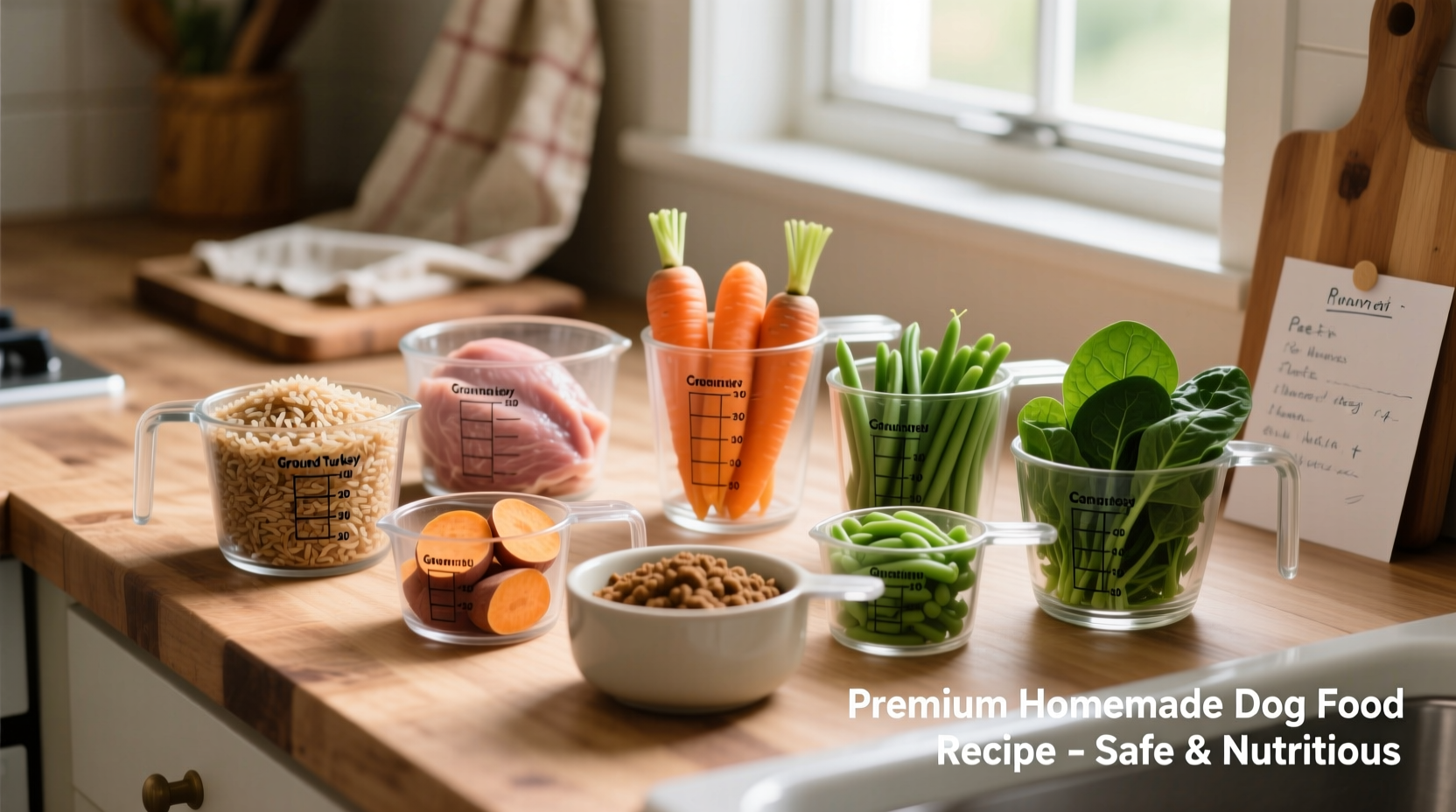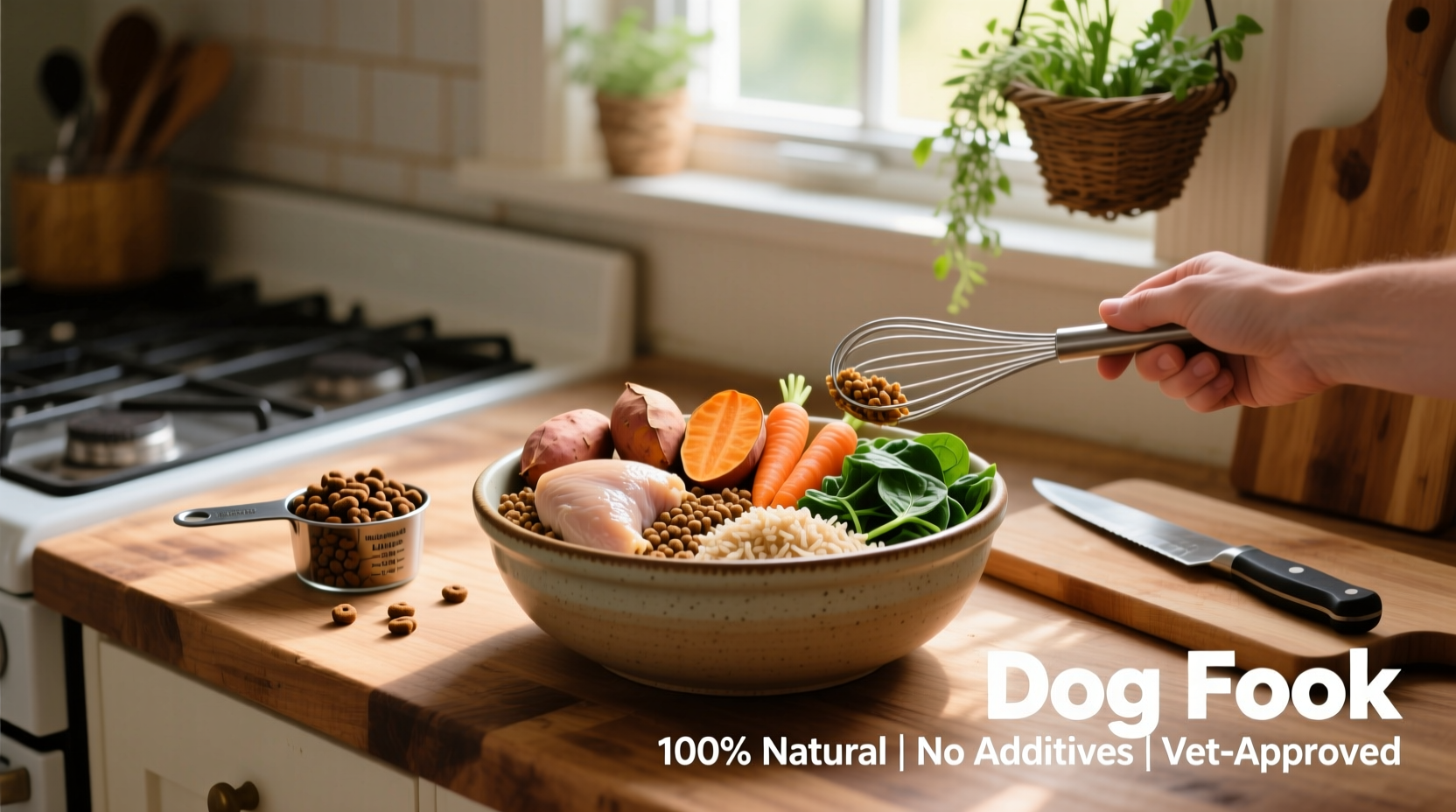Creating nutritious homemade dog food requires careful planning beyond simply cooking human-grade ingredients. While commercial pet foods undergo rigorous nutritional testing, DIY recipes often lack essential vitamins and minerals that keep dogs healthy long-term. This guide provides science-backed methods to prepare balanced meals that meet AAFCO (Association of American Feed Control Officials) nutrient profiles for adult dogs.
Why Most Homemade Dog Food Recipes Fail
Research from the UC Davis School of Veterinary Medicine shows 95% of online dog food recipes contain critical nutritional imbalances. The most common mistakes include:
- Insufficient calcium (leading to bone disorders)
- Incorrect calcium-to-phosphorus ratios
- Lack of essential fatty acids
- Vitamin E and D deficiencies
- Excessive fat content causing pancreatitis
"Homemade diets require precise formulation," explains Dr. Cailin Heinze, a board-certified veterinary nutritionist. "Dogs need 37 essential nutrients in specific proportions that rarely occur in simple 'kitchen sink' recipes."
| Nutrient | Deficiency Risk | Excess Risk | Safe Range (per 1000 kcal) |
|---|---|---|---|
| Calcium | Rickets, fractures | Kidney damage | 1.25-3.25g |
| Vitamin D | Weak bones | Organ calcification | 125-500 IU |
| Zinc | Skin lesions | Vomiting, diarrhea | 30-150mg |
| Omega-3 | Poor coat health | Bleeding issues | 0.1-2.5g |
Essential Components of Balanced Homemade Dog Food
Professional canine nutrition follows the 50-25-25 rule for proper nutrient distribution. This framework ensures your dog receives complete nutrition without dangerous imbalances.
Protein Foundation (50% of Recipe)
Choose lean, cooked proteins appropriate for your dog's size and health:
- Chicken breast (skinless): Best for sensitive stomachs
- Ground turkey: Lower fat than beef
- Canned salmon: Provides essential omega-3s
- Egg (cooked): Complete protein source
Avoid: Raw meat (bacterial risk), bones (choking hazard), processed meats (high sodium).
Vegetable Component (25% of Recipe)
Cooked vegetables provide fiber and micronutrients. Always cook vegetables for better digestibility:
- Carrots: Beta-carotene source
- Green beans: Low-calorie fiber
- Pumpkin: Digestive regulator
- Spinach: Iron and calcium (use sparingly)
Never feed: Onions, garlic, grapes, raisins, or avocado (all toxic to dogs).
Carbohydrate Base (25% of Recipe)
Complex carbohydrates provide sustained energy:
- Brown rice: Most digestible grain
- Quinoa: Complete protein source
- Sweet potato: Vitamin A powerhouse
- Oatmeal: Soluble fiber benefits

Critical Supplements You Must Add
Whole foods alone cannot meet canine nutritional requirements. The AAFCO Dog Food Nutrient Profiles specify minimum levels for 37 essential nutrients that require supplementation in homemade diets.
Mandatory Supplements by Weight
- Calcium: 800-1000mg per pound of cooked meat (use calcium carbonate powder)
- Omega-3: 300mg EPA/DHA per 30 pounds body weight (fish oil)
- Multi-vitamin: Formulated specifically for dogs (never use human vitamins)
- Vitamin E: 10-40 IU per pound of food (prevents nutrient oxidation)
"The calcium-to-phosphorus ratio must stay between 1:1 and 2:1," notes veterinary nutrition research published in the Journal of Animal Science. "Imbalances cause irreversible skeletal damage in growing puppies."
Step-by-Step Recipe Framework
Follow this professional formulation method for safe homemade dog food:
- Weigh all ingredients using kitchen scale (volume measurements are inaccurate)
- Cook proteins separately to proper internal temperatures (165°F for poultry)
- Steam vegetables until soft (improves nutrient absorption)
- Cool all components before mixing (heat destroys supplements)
- Add supplements according to package directions based on total batch weight
- Mix thoroughly and refrigerate for 24 hours before serving (allows flavor integration)
Context Boundaries: When Homemade Isn't Appropriate
Homemade dog food requires significant commitment and isn't suitable for all situations:
- Puppies and senior dogs: Require precise nutrient profiles that change weekly/monthly
- Dogs with medical conditions: Kidney disease, pancreatitis, or allergies need customized formulations
- Time-constrained owners: Requires weekly cooking and proper storage
- First-time formulators: Consult a board-certified veterinary nutritionist before starting
The American College of Veterinary Nutrition recommends professional formulation for dogs under 18 months or with health conditions. "Homemade diets require 4-6 weeks of transition and regular blood work monitoring," advises Dr. Jennifer Larsen.
7-Day Rotation Plan for Nutritional Variety
Prevent nutrient deficiencies by rotating protein sources weekly:
- Monday-Wednesday: Chicken-based recipe
- Thursday-Friday: Turkey-based recipe
- Saturday-Sunday: Fish-based recipe
Always maintain the 50-25-25 ratio while rotating proteins. Introduce new proteins gradually over 7 days to prevent digestive upset.
Safe Storage Guidelines
Proper storage prevents bacterial growth in homemade dog food:
- Refrigeration: Store in airtight containers for up to 4 days
- Freezing: Portion into silicone molds, freeze solid, then transfer to freezer bags (keeps 3 months)
- Thawing: Move portions to refrigerator 24 hours before serving (never microwave)
Sample Beginner Recipe: Balanced Chicken Dinner
This AAFCO-compliant recipe serves a 30-pound adult dog for one day:
- 12 oz (340g) cooked chicken breast
- 6 oz (170g) cooked brown rice
- 6 oz (170g) steamed carrots and green beans
- 1,000mg calcium carbonate
- 300mg fish oil
- Dog-specific multivitamin (per package instructions)
Preparation: Combine cooled ingredients in food processor until uniform texture. Refrigerate 24 hours before serving. Divide into two meals with 1 teaspoon olive oil added to each for essential fatty acids.
When to Consult a Veterinary Nutritionist
Professional guidance is essential for:
- Puppies under 18 months
- Dogs with chronic health conditions
- Recipes for more than 3 months duration
- Any signs of nutritional deficiency (dull coat, lethargy, digestive issues)
The International Association of Pet Food Science offers a veterinary nutritionist directory for recipe formulation assistance. Board-certified specialists typically charge $150-$300 for customized recipes with follow-up monitoring.











 浙公网安备
33010002000092号
浙公网安备
33010002000092号 浙B2-20120091-4
浙B2-20120091-4